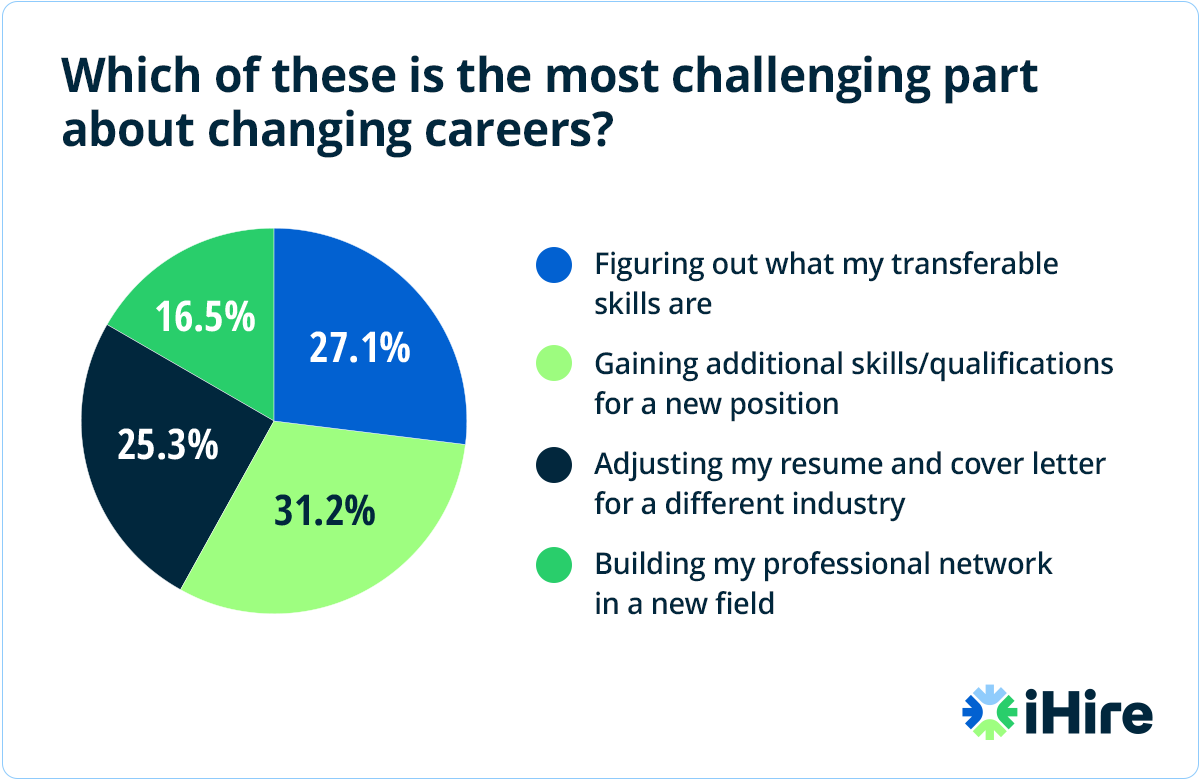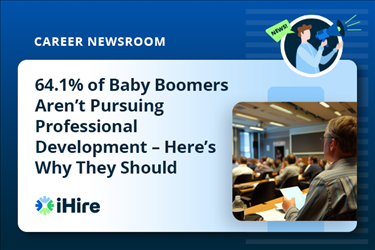- Job Seeker Resources
- |
- Last Updated: June 11, 2025

Career Change 101: How to Pivot With Purpose [Questions, Answers & Poll Results]
1. How do I successfully switch industries, especially later in my career?
Answer: Switching industries requires reframing your experience to highlight transferable skills and value, not just job titles. Focus on your ability to adapt, solve problems, and bring a fresh perspective. Employers want to see how your previous success can apply to their world.
- Identify and emphasize transferable skills in your resume and interviews.
- Research the target industry’s challenges and align your messaging to them.
- Take courses or certifications to bridge any knowledge gaps.
Recommended Reading:
How to Change Careers: A Preparation Checklist
2. Should I mention a career change in my cover letter?
Answer: Yes! Use your cover letter to narrate the “why” behind your pivot. Make it about what you’ve learned, what you bring to the new field, and your genuine enthusiasm for the change. Avoid sounding apologetic; instead, frame your transition as a strength.
- Open with a strong statement of interest and intent.
- Acknowledge the career shift and tie it to your skills.
- End by connecting your background to the role’s requirements.
Recommended Reading:
How to Write a Career Change Cover Letter (With Example)
3. How do older professionals overcome age bias or being labeled as overqualified?
Answer: Age bias is real, but you can counteract it by demonstrating curiosity, energy, and relevance. Emphasize recent learning, tech-savviness, and a collaborative mindset. Avoid listing experience that’s not relevant or dates that highlight your age.
- Focus your resume on the last 10–15 years and relevant accomplishments.
- Avoid outdated technologies or practices in your materials.
- Show you’re current – mention recent certifications, tools, or systems.
Recommended Reading:
6 Proven Job Search Tips for Baby Boomers
4. How do I explain employment gaps or stepping back in my career (e.g., caregiving)?
Answer: Be honest, brief, and forward-looking. Acknowledge the gap or step back (e.g., family, health), then quickly pivot to your readiness and excitement for what’s next. Focus on the value you can bring now.
- Use your cover letter to explain the gap briefly and confidently.
- Reframe the experience as building empathy, resilience, or soft skills.
- Show that your skills remain sharp through courses, volunteering, etc.
Recommended Reading:
How to Explain Resume Gaps in Employment: 6 Real-World Examples
Find Your New Career Today
Access job listings, resume tools, interview guides, and more.

Job Seeker Sign In
We Value Your Privacy
5. How do I deal with being “overqualified” for a job I actually want?
Answer: Reframe “overqualified” as “well-prepared.” Emphasize your commitment, enthusiasm, and specific interest in the role. Address concerns directly in your cover letter if needed.
- Show how the role aligns with your long-term goals.
- Highlight adaptability and team spirit, not just leadership experience.
- Avoid listing excessive qualifications that aren’t needed for the job.
Recommended Reading:
9 Tips for Applying When You’re Overqualified for a Job

6. What resume format is best for a career pivot or skills-focused application?
Answer: A functional or hybrid resume is ideal. They highlight transferable skills at the top and support them with relevant job history. This helps employers quickly connect your skills to their needs, even if your most recent title doesn’t match.
- Use a professional summary and core competencies section.
- List accomplishments that show problem-solving in various contexts.
- Avoid only chronological formats that emphasize unrelated roles.
Recommended Reading:
A Look at the 3 Top Resume Strategies
7. How do I figure out what I really want to do with my career?
Answer: Discovering your ideal career path begins with self-reflection and clarity. Think about your interests, values, strengths, and what energizes you at work. This process isn’t about finding a perfect answer immediately, but rather about identifying work that aligns with who you are and where you want to grow.
- Identify patterns in your favorite roles, projects, or work environments in the past.
- Use structured workbooks or assessments to explore your values and strengths.
- Try informational interviews, volunteering, or short courses to validate your interests.
Recommended Reading:
Career Clarity: How to Find Meaningful Work [Free Workbook]
8. Are cover letters still necessary, and do hiring managers actually read them?
Answer: Yes, especially for career changers! While not every manager reads them, many still do. A strong cover letter can humanize your application and provide context that a resume can’t convey alone.
- Always send a cover letter if the job application allows for it.
- Use it to explain unique situations like relocations or pivots.
- Keep your cover letter concise, targeted, and enthusiastic.
Recommended Reading:
Ask a Career Advisor: Do I Need to Include a Cover Letter With My Job Application?
9. What are the best free online career assessments to help me identify the right career path?
Answer: Free online career assessments can be valuable tools for gaining insights into your strengths, interests, and potential career paths. They help you understand how your personality and skills align with various professions, enabling you to make informed career decisions.
- Utilize a variety of assessments to get a comprehensive view of your career preferences.
- Take time to analyze and reflect on the outcomes to understand how they align with your career aspirations.
- Consider discussing your assessment results with a career coach or mentor for personalized advice.
Recommended Reading:
Guide to the Top 5 Free Online Career Assessments
10. How do I explain multiple job changes or relocations without looking like a job hopper?
Answer: Provide concise and honest explanations that highlight your adaptability and the skills gained from each experience. Emphasize how these transitions have prepared you to contribute effectively in a stable, long-term role.
- Use your cover letter to briefly explain the reasons for your moves, focusing on positive outcomes.
- In your resume, consider grouping similar roles or using a functional format to highlight skills over chronology.
- During interviews, reassure employers of your commitment by discussing your desire for long-term growth.
Recommended Reading:
Ask a Career Advisor: How Do You Explain Job Hopping in an Interview?
Watch the full recording of the webinar, “Career Change 101: How to Pivot With Purpose,” for more expert advice.
Sign In or Register to access all articles and insider tips for help in your job search.
Search for Biotechnology Jobs
RELATED JOBS
Perform electrical and mechanical tests on copper enameled wire to evaluate quality,...
Lab Technician Job #49982Lab Technician Laboratory Columbus, OH, US Pay Rate Low: 18.50 | Pay Rate High: 18.50 Our...
Construction Compliance AuditorConstruction Compliance Auditor CONSTRUCTION COMPLIANCE AUDITOR - ENVIRONMENTAL SCIENTIST...
Director Quality AssuranceThe Quality Assurance Director will provide compliance leadership and direction to our Company...
Principal Biostatistician FSP - Chemistry, Manufacturing and ControlWho Are You?** An experienced Biostatistician with in-depth Bayesian analysis experience and had...
RELATED RESOURCES
Find the Right Job Faster
- Get personalized job matches sent to your inbox every day
- Connect directly with employers before your competition
- Advance your career with expert advice on interviewing, salary negotiation, and more
We value your privacy




